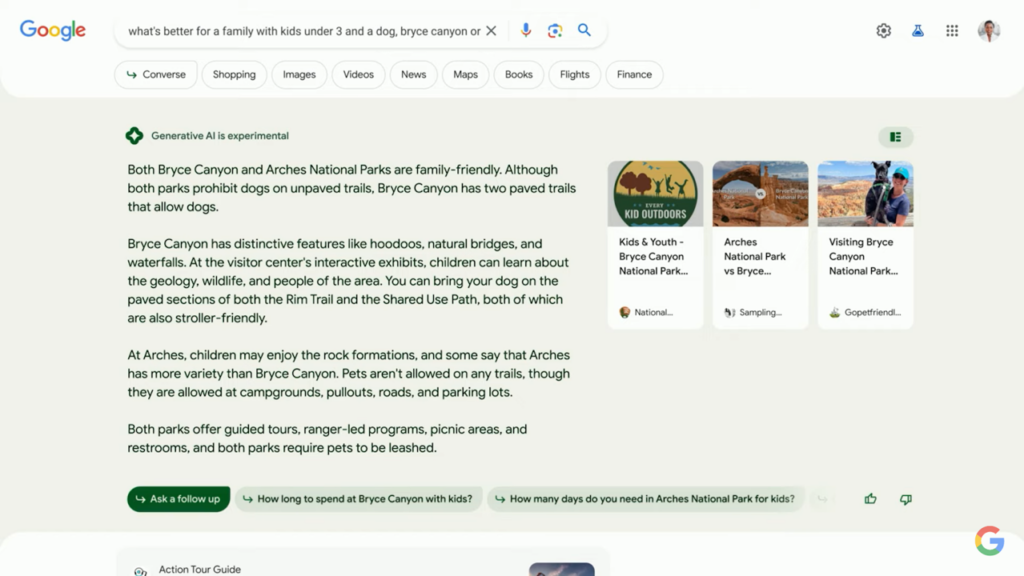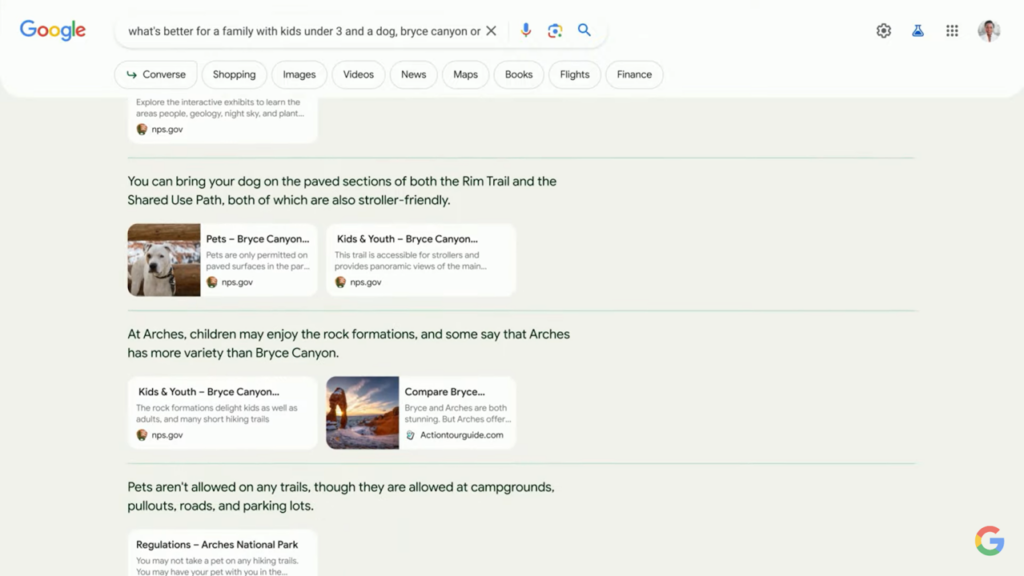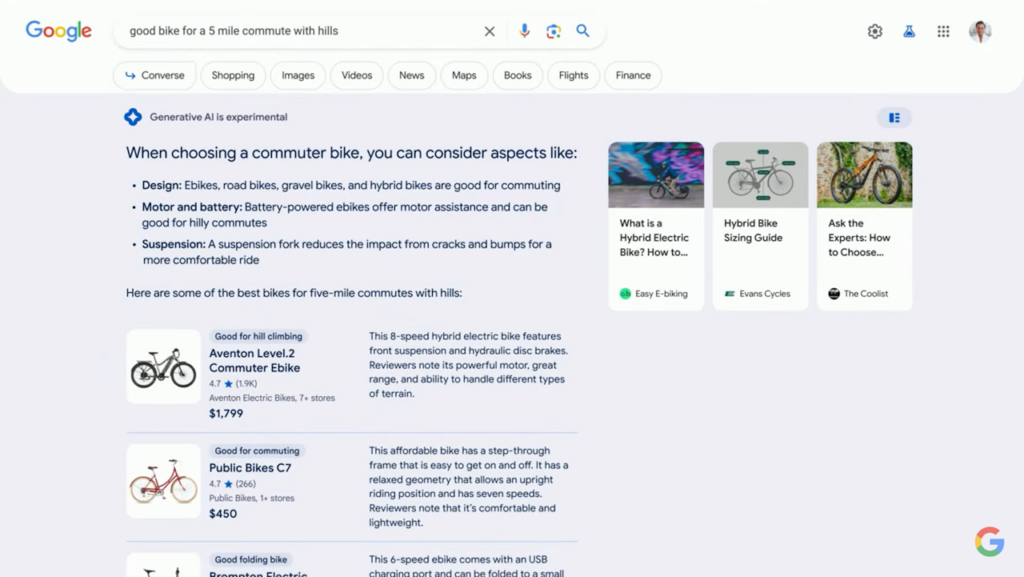SEO
Last week was the Google I/O, Google’s annual developer conference, where their new products and services are showcased. This one in particular was hotly anticipated, after their previous announcements on AI – seen as a rushed response to Microsoft’s new Bing experience which utilises ChatGPT – led to Google Bard presenting factually incorrect information in their demo, sending their share price tumbling. This time around, the two hour presentation felt better prepared and again showcased Google leading the way with AI – which was reflected in a share price increase.
Google reiterated their AI credentials, stating that as a company they are seven years into their AI-first journey. Heavy emphasis was placed on having a bold ambition whilst being responsible. This is a point they have laboured in defence of being slower to integrate AI chatbots into search but has more weight following the outcry from tech moguls that the development of and access to AI should be slowed.
They stated that their aim is to make AI helpful for everyone – improving knowledge and learning, boosting creativity and productivity, enabling others to innovate and building and deploying AI responsibly – and these were all showcased in various forms throughout the conference.
Included in this summary:
- Vastly improved large language model capabilities
- The teasing of Gemini, a new LLM
- The introduction of Generative AI
- The improved shopping experience
- Conversational mode
- Highlighting hidden gems among UGC
- The impact of these new features on Google Search
- What you can do now
- Closing thoughts
Vastly improved large language model capabilities
Google Bard, which up until now had limited access, was announced to be using PaLM 2 (replacing LaMDA) – their latest large language model (LLM) which is stronger in mathematical, logic and reasoning skills and also trained on multilingual texts, spanning over 100 languages, enabling more nuanced responses.
In the example demonstrated, it was seen to be debugging code, explaining the fixes and also translating the comments into another language for improved collaboration on global projects.
Google went on to confirm that 25 products are now powered by PaLM 2 and demonstrated impressive examples across Gmail (Help Me Write), Google Maps (Immersive Views) and Google Photos (Magic Editor), all of which will be rolling out over the course of the year and demonstrate how AI is not just restricted to Google Bard, but can be used to improve everyday experiences with other tools.
The teasing of Gemini, a new LLM
Google also shared insight into Gemini – a new LLM that is currently being trained and will eventually power Bard. Gemini has been built from “the ground up to be multimodal [and] highly efficient at tool and API integrations, and built to enable future innovations, like memory and planning”. Being multimodal, it will work with inputs based on audio, imagery and video – not just text.
Google also reiterated their point about responsibility here, and confirmed that it will support tools which identify “synthetically created content” by use of watermarks and metadata – vital, as increasing numbers of sites start to produce more AI generated content as the technology becomes more widespread.
The introduction of Generative AI
Whilst there are no timelines on when Gemini will be ready, Google went on to demonstrate how the technology behind Bard (now powered by PaLM 2) is being integrated into Google Search – which everyone within the SEO industry had been eagerly awaiting since the AI race first started.
Google announced this is known as the Search Generative Experience (SGE), with AI powered responses directly within the search results. In the example shown, a long search query was entered which showed a detailed response summarised at the top of the page from various articles on the web, known as an AI snapshot.
This was similar in nature to a large featured snippet, which will no doubt lead to an increase in zero click searches for informational search queries, but the main difference is the information shown was a summary based on information from numerous related sites – not just one. However, site owners may be reassured that citations were included on the right hand side – along with imagery, page name, site name, and icon – so where the information has come from is corroborated.

There’s also an icon to expand the citations which shows a full page of citations, with more sites listed alongside detailed information such as what appears to be meta descriptions.

An improved shopping experience
For commercial search queries, Google can also show more product listings within the results (in addition to the current sponsored listings), powered by the Google Shopping Graph which contains more than 35 billion listings.
For example, in the demo they searched for “good bike for a 5 mile commute with hills” which returned considerations at the top of the page, along with multiple product listings that include images, names, descriptions and reviews – thereby helping broaden the visibility of products for new types of search queries.

Conversational mode
These AI search results also provide a button to “Ask a follow up” which takes the searcher to “Conversational Mode”. Here, it remembers your conversation, so if you then ask to see “red bikes” it will remember that the context is for a “5 mile commute with hills”, thereby understanding your intent.
Highlighting hidden gems among UGC
Google also announced that in the coming weeks searchers will start to see a “Perspectives” filter for search queries which would benefit from the experiences of others, helping bring more diversity to search results which are often overshadowed by larger, more established sites.
The aim of this is to show videos, images and posts which have been shared on discussion boards, Q&A sites and social media platforms, along with information on the content creators such as their name, profile picture and information about the popularity of their content.
In addition to highlighting these perspectives, Google will also be rolling out a new Helpful Content update to better showcase content such as this, which features unique expertise and experience, helping highlight “hidden gems”.
This new perspectives feature serves to surface human content alongside that generated by AI. It also allows Google to bring in more of the creator content that is popular on TikTok which is seen as a threat to the search engine’s market share. Finally, the carefully chosen naming of this enables it to be identified as an individual’s viewpoint rather than carefully vetted EEAT content that is returned in universal results.
The impact of these new features on Google Search
Whilst these new features to Google Search haven’t yet rolled out, they’re likely to have a significant impact on organic search results.
- Reduced visibility for traditional organic search results – In all of Google’s examples the Generative AI results appear above the traditional organic results (although not above Google’s sponsored ads). This will likely have a negative impact on click-through-rate (CTR) leading to more zero click searches, although until this is rolled out we won’t know the scale of this and how this varies by device or type of query.
- Traffic from citations – If information from your site is used within a Generative AI result then typically you should be listed as a citation. Again, the CTR from these is unknown, although hopefully Google will follow Bing’s lead on this and announce additional reports within Google Search Console to give visibility over this.
- Changes in search behaviour – In many of the examples given they used very long search queries which resulted in very specific answers. Historically, however, these types of search queries may have been split into multiple and smaller searches. This could see a shift from short-tail to longer-tail search queries which are more conversational, thereby emphasising the importance of optimising for long-tail search queries. Ultimately, this could lead to less searches, but relevance and intent should be much better matched, leading to an improved user experience.
- Improved visibility for user created content – Helpful content which features unique expertise and experience should perform better at the expense of content which has instead been created to attract clicks.
What can you do now?
As of now the changes to Google Search haven’t been rolled out and will only be available to limited users in Search Labs as an early experiment, so no one knows for sure how to optimise for it. However, there are several best practice recommendations which (even now) can help improve relevancy and accessibility:
- Optimise for related search queries – Look into what you’re currently ranking for and see what Google suggests users are also searching for, this could help improve your visibility for any follow up search queries they may have.
- Optimise for longer-tail search queries – For example, product use cases such as “perfect for mountain climbing” or “ideal for summer parties” etc. Search queries will likely become more complex as Google gets better at returning more relevant responses,so providing more information may give you an edge over competitors with more generic sounding descriptions.
- Utilise imagery and alt text – Google citations often show imagery, so including imagery could improve the CTR from any citations where you have visibility. Google Bard was also shown to return image results, so including optimised alt text helps give Google more context on what’s shown.
Closing thoughts
Google believes that people will always value the input of other people, and that a thriving web is essential to that. While Google Search is evolving and search behaviour may change to longer, more complex search queries, Google is still reliant on accessible websites with well-optimised and relevant content to help teach its LLMs. These websites will be credited with a linked citation when used.
Whilst organic traffic to regular listings may decline as some results are instead served as AI snapshots, LLMs should perform better at identifying a searcher’s intent and providing highly relevant results, thereby improving overall traffic quality and user experience.
It’s not just Google Search that is evolving though, Google also confirmed that its deployment of AI is moving fast, with multiple integrations into Google products and Google Workspace (via Duet AI). These will be available to both consumers and businesses, opening up new and exciting possibilities for using AI to improve productivity, making its use a seamless experience in the everyday and transforming the way people work.
We will be closely watching for updates, but please get in touch in the meantime if you need any support with your SEO strategy.